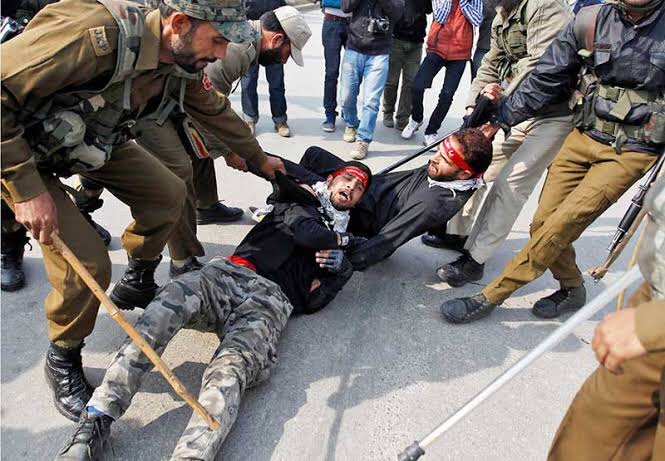Turkish News agency TRT has published a story about A family of Kashmiris detained in far away Indian Jails.
The story describes how Kashmiri people are being imprisoned under Black law which gives no roam for them to get justice. Haseena Begum, holding her son’s photo close to her chest, is inconsolable.
“Amir was asleep; they dragged him by his ears and took him away,” the 56-year-old tells a group of women who have come to see her in early February in the Sheeri neighbourhood of north Kashmir’s Baramulla district.
“It’s been seven months; I haven’t seen him. My heart pains whenever I think of him,” Begum says.
As the guests leave in ones and twos, Begum tells her daughter-in-law to lock the front door and not allow any more visitors inside.
“I don’t want to speak to anyone,” she reclines on the cushion, signs of exhaustion now visible on her face. “They [the visitors] were telling me Amir [her son] will come back soon, but I know there is very little truth in their words. No one understands the pain of a mother.”
Begum is fed up with meeting journalists. Many reporters have come to her house, interviewed her and gone. “Nothing happens. The Modi government is unmoved,” she says, explaining how journalism critical of the police’s heavy handed tactics and unlawful detentions has had no impact on the government.
Her son Amir Parvez Rather was picked up by the Indian army on August 5, the day when the ruling BJP tabled the controversial bill in the parliament that eventually led to the annulment of the nominal autonomy of Jammu and Kashmir, a disputed region between India and Pakistan since 1947.
Begum says Amir, who is 26 years old, was first roughed up in an army vehicle and then taken to an unknown location.
The search for him began. The Indian government had imposed a severe communication blockade on the entire disputed region, shutting down the internet, mobile phone networks and landlines. The blackout continued for several months, with high-speed internet still restricted, Begum says she went to the nearest police station to enquire about her son’s whereabouts. But the officer in charge there mistreated her.
“I have seen police officers, but he was the worst. I pleaded before him to let go of my son, but he didn’t listen. He mocked at me and my poverty,” Begum said, adding that Amir was the only male member in their family.
With no one around to help, Maryam Rasool, Amir’s wife, took up the task of finding her husband.
“I would wake up at eight in the morning and leave home to find him,” Maryam tells. “It had become a routine of sorts as I followed it for at least 21 days. For the first couple of weeks, I repeatedly visited the local police station and inquired about Amir, but they didn’t help me. They asked me to stop looking for Amir.”
Maryam did not give up, however. In the absence of public transportation — as the entire region was either under a military curfew or observing a shutdown in defiance of the loss of autonomy — she walked “hundreds of miles” from one district to another, knocking on the doors of every police station along the way, asking for Amir.
After several weeks, she landed in Srinagar, the summer capital of Jammu and Kashmir state. She went to the district’s biggest prison facility — the Srinagar Central Jail — where she found her husband’s name written on a list of people who were moved over a thousand kilometres away to the Agra jail in the north Indian state of Uttar Pradesh.
It was a relief to learn her husband was alive since Kashmir has several unidentified mass graves and cases of disappearances, with mothers waiting for several years, hoping to see their disappeared sons return home. Yet Maryam was aware of the long, arduous struggle to first raise the money and then take the difficult journey through to Agra.
“I am a peon at a private school. I earn less than Rs.3000 ($45) a month. I have no savings to spend on traveling to Agra,” Begum says.
Four months later in November, she eventually borrowed some cash from her relatives and went to Agra along with her three-year-old son.
At the Agra jail, she found Amir in bad health. “He told me he was passing blood in stool. His body was aching. He also said he has seen the daylight only two times in the last four months,” Maryam says.
Maryam pulled herself together and returned to Srinagar. She wrote to several top government officials, including the Divisional Commissioner of Kashmir province, asking them to move her husband back to Srinagar’s Central Jail, citing his failing health.
“None of those officials responded,” she says.
The Indian government has imposed a string of draconian laws in Jammu and Kashmir to deal with both the popular armed insurgency and anti-India protests that break out sporadically in different parts of the region. A so-called ‘black law’ named the Public Safety Act (PSA) has always come handy to arrest and detain community organisers, activists or anyone whom the police suspect of being a “stone pelter”.
Amir has been detained under the PSA, a law that robs detainees of court trials for a minimum of two years. The government’s dossier describes him as: “An incorrigible anti-social element who has been found at the forefront of disturbing the public order in whole Narwar Belt of district Baramulla, during the protests which broke out against the killing of Hizbul Mujahidin Commander, Burhan Muzzafar Wani on July 8, 2016, resulting in a serious threat to the security of the State.”
Amir’s family finds the charges exaggerated and out of step with reality.
His mother Begum says that Amir hurled stones at the police only once, way back in 2016 – when a region-wide revolt broke out over the killing of a popular rebel commander Burhan Wani.
“Everyone was pelting stones, my son was not the only one. Everyone was on the street, including children and women. After that incident, he never pelted the authorities with stones, but still he is being treated like a criminal and detained under the PSA,” Begum said.
The Indian state hasn’t revealed the total number of Kashmiris moved to faraway prisons in different states of the country since August 5, but according to a Reuters report published in October 2019, there are at least 84 Kashmiris incarcerated in Uttar Pradesh’s Agra jail alone.
Most of them come from difficult economic conditions. Their families are unable to afford lawyers and cannot bear the costs of flight, bus or train tickets in order to visit them.
The sudden death of Advocate Mir Shafqat Hussain – who was pleading the cases of the majority of the detainees in the High Court in Srinagar- has come as another blow to these families. In light of the intricacies of India’s slow judicial system, Hussain was a godsend for them.
“He knew the entire case, knew that my husband was innocent. Now, whatever little hope we had of Yasir’s release has gone,” says Sami, the wife of another Kashmiri detainee, Yasir Ahmad Alai.
Another detainee Waseem Malla’s family has visited him in a prison in Agra only once in the past six months. Malla, 20, dropped out of school because his parents couldn’t afford to educate him. To help his father, he started working as a daily wage labourer. He was arrested along with Amir, Alai and dozens of other Kashmiris on August 5.
Malla’s wife Masarat told that the police did not tell them where Malla was taken for several months until a stranger who had met his son in the Agra prison showed up at their house. He told them Malla was also in the Agra prison and had asked him to tell Masrat that he needed some warm clothes. “Soon after hearing that I went to see him along with my two daughters,” she said.
The original article was published in TRT World link





